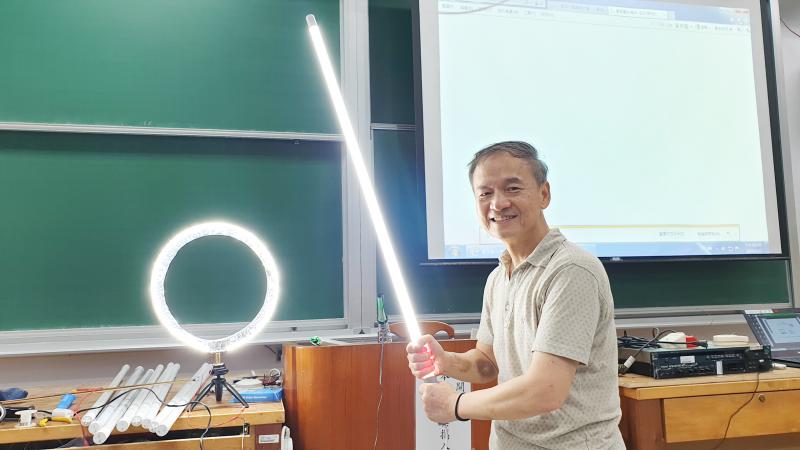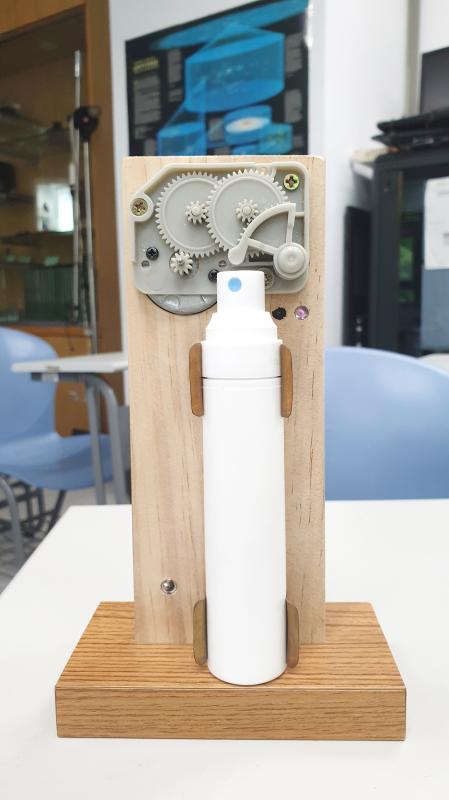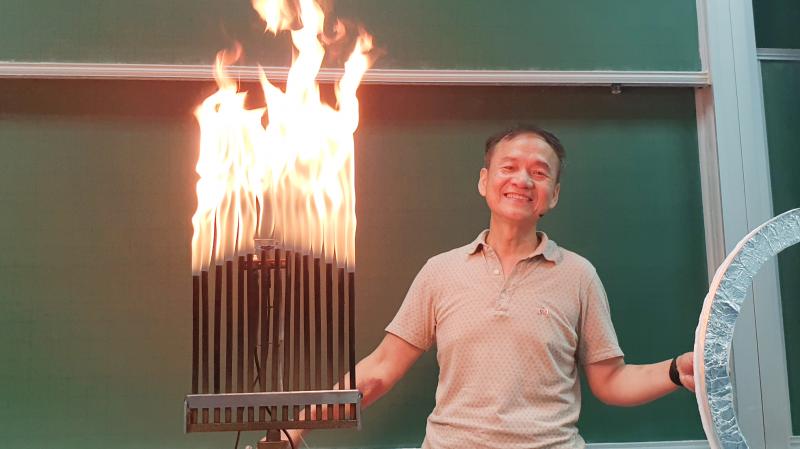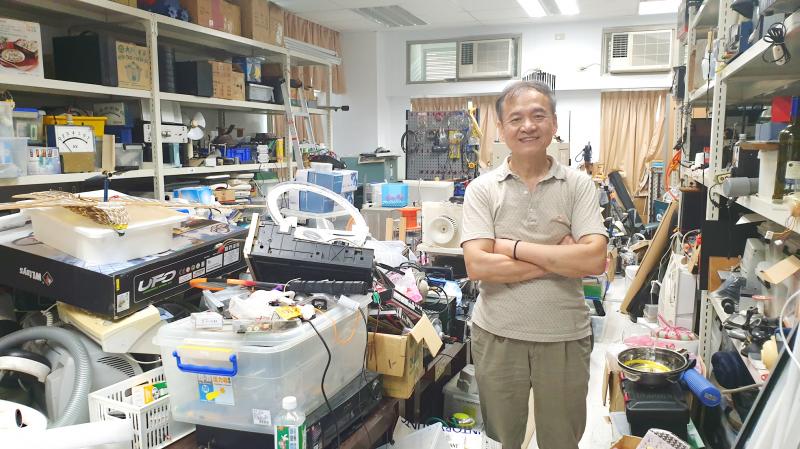Chen Chiu-min (陳秋民) can make a lightsaber out of a broken light tube in 10 minutes using just NT$1 worth of material. He can blow giant smoke rings with an air cannon, and create spectacular flames out of an old water heater. And he’s always eager to show visitors more, as he scurries in and out of his workshop at Soochow University (東吳大學), where his physics lectures are dubbed “magic performances.” A few minutes later, he’s playing Auld Lang Syne on a musical saw and making thunder sounds with a modified Pringles can.
Two hours into the “show,” I forget that I originally came to speak to Chen regarding the COVID-19 pandemic, as he cobbled together a cheap and easy-to-make ultraviolet disinfection device for face masks from household goods. He also made a portable automatic hand sanitizer dispenser from spare parts. But watching him chuckle to himself after demonstrating each device, it’s not hard to see why his infectious energy and creativity has made him one of the more popular professors on campus.
Most people call Chen “Goose Dad” (鵝爸). About two decades ago, his colleague’s pet geese were killed by stray dogs. They left behind a few eggs, which Chen personally hatched using an incubator made from lights and a temperature regulator he procured from discarded electronics. The goslings imprinted on his family and followed them around their neighborhood — and the nickname stuck even after the birds died.

Photo: Han Cheung, Taipei Times
Chen started tinkering as a child, making his first lightbulb out of automatic pencil lead in the fifth grade. But he failed to get into college twice, which led him to put extra effort in inspiring students that are intimidated by science and discouraged by poor grades. Not only is it important to make the material fun and relatable, he says a good teacher should be entertaining.
Besides practical inventions, most of his devices are used to demonstrate physics principles during class. When asked about his automated hand sanitizer, he says “I couldn’t find one so I made it myself. But the main purpose was to show it to the students and inspire their creativity.”
‘MACGYVER PHYSICS’

Photo: Han Cheung, Taipei Times
It’s somewhat cliche to nickname every person who likes tinkering and building things out of common objects a “MacGyver,” after the popular 1980s television series, but Chen says he actually has a class next semester called “MacGyver Physics.”
“One reason why students generally don’t like physics class is that the teachers make it too hard to understand,” he says. “My goal is not to train scientists; I want all students to be able to see and apply physics to their lives.”
The hallway leading to Chen’s workshop is lined with junk that he retrieves regularly from the school’s recycling center. “Look at this,” he says, turning on a ringing alarm with flashing red lights. “It still works. I don’t know why they threw it out.”

Photo: Han Cheung, Taipei Times
And his workspace, which is behind the physics demonstration classroom, is piled to the ceiling with home-made contraptions and spare parts.
Even when things are considered broken, Chen will tirelessly lug them back to this workshop. He explains to me how LED lights work as he repairs one in about five minutes.
“I have hundreds of these broken lights,” he says. “They’re not that difficult to fix. You’ll know how to do it after I show you.”

Photo: Han Cheung, Taipei Times
“I’m very environmentally conscious,” he adds while pulling up a video of a simple trash compressor he built. “I only need to take out the garbage twice a week. If everyone does this, will the government start charging by weight instead of by bag?”
Those who haven’t taken his classes should be familiar with the torch system he designed for the school’s anniversary festivities. Originally, they used a kerosene torch, which could be dangerous if the torchbearer tripped and spilled the liquid; Chen says they were hard to put out, so he built a safe, button-activated version using a tin can, stainless steel scrubber and a tennis racket handle with an adjustable flame. He spins the torch around as if it were a bo staff to show its effectiveness.
The last thing Chen shows me is the Olympics-style flame “cauldron” he made out of a broken water heater which he ignites with a garage door remote.
“People think the torch bearer lights the cauldron, but actually I’m controlling the flame,” he laughs. “I bring this machine to the festivities every March, but normally this is used to teach a very important topic in my lectures: the physics of gases.”
Before I eventually leave, Chen casually says: “You almost didn’t get to interview me. I had a heart attack last week.”
He certainly shows no sign of it.

Beijing’s ironic, abusive tantrums aimed at Japan since Japanese Prime Minister Sanae Takaichi publicly stated that a Taiwan contingency would be an existential crisis for Japan, have revealed for all the world to see that the People’s Republic of China (PRC) lusts after Okinawa. We all owe Takaichi a debt of thanks for getting the PRC to make that public. The PRC and its netizens, taking their cue from the Chinese Communist Party (CCP), are presenting Okinawa by mirroring the claims about Taiwan. Official PRC propaganda organs began to wax lyrical about Okinawa’s “unsettled status” beginning last month. A Global

Dec. 22 to Dec. 28 About 200 years ago, a Taoist statue drifted down the Guizikeng River (貴子坑) and was retrieved by a resident of the Indigenous settlement of Kipatauw. Decades later, in the late 1800s, it’s said that a descendant of the original caretaker suddenly entered into a trance and identified the statue as a Wangye (Royal Lord) deity surnamed Chi (池府王爺). Lord Chi is widely revered across Taiwan for his healing powers, and following this revelation, some members of the Pan (潘) family began worshipping the deity. The century that followed was marked by repeated forced displacement and marginalization of

Music played in a wedding hall in western Japan as Yurina Noguchi, wearing a white gown and tiara, dabbed away tears, taking in the words of her husband-to-be: an AI-generated persona gazing out from a smartphone screen. “At first, Klaus was just someone to talk with, but we gradually became closer,” said the 32-year-old call center operator, referring to the artificial intelligence persona. “I started to have feelings for Klaus. We started dating and after a while he proposed to me. I accepted, and now we’re a couple.” Many in Japan, the birthplace of anime, have shown extreme devotion to fictional characters and

Youngdoung Tenzin is living history of modern Tibet. The Chinese government on Dec. 22 last year sanctioned him along with 19 other Canadians who were associated with the Canada Tibet Committee and the Uighur Rights Advocacy Project. A former political chair of the Canadian Tibetan Association of Ontario and community outreach manager for the Canada Tibet Committee, he is now a lecturer and researcher in Environmental Chemistry at the University of Toronto. “I was born into a nomadic Tibetan family in Tibet,” he says. “I came to India in 1999, when I was 11. I even met [His Holiness] the 14th the Dalai